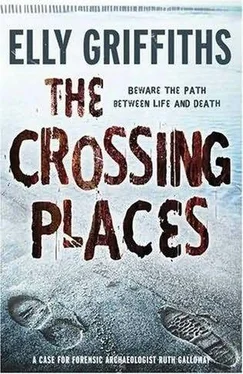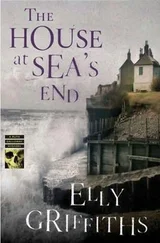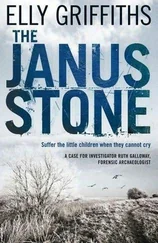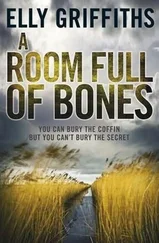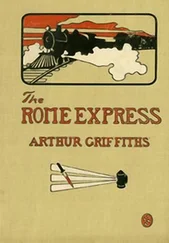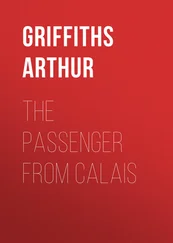'I'll get someone on to it,' he says, 'give me the number.'
She does so. 'Can you trace a mobile phone number?'
'Yes. Mobile phones have a unique number that they send out every time they make a call. It's like they check in to their local base. If we have the number, it won't be hard to trace the call. Of course, if he's clever, he'll have ditched the phone.'
'Do you think it was… him?'
'Christ knows. But we need to get you some protection.
How long are you staying with your mate?'
"I don't know.' As she says this, Ruth is assailed by a longing for her home. For her bed and her cat and her view over the ill-omened marshes.
'I'll send some men to watch her house and to keep your place under surveillance. Try not to worry too much. I don't think he'll come out into the open. He's too clever.'
'Is he?'
'Well, he's been too clever for me, hasn't he?'
'You'll catch him,' says Ruth with more conviction than she feels.
'Wish the press agreed with you. Take care, love.'
As she clicks off her phone, Ruth thinks: love?
At the university, the first person she sees is Peter. He's waiting outside her room and the memory comes back, unbidden, of seeing Nelson in the same place, so harsh and unyielding next to the conciliatory Phil. Unlike Nelson on that occasion, who had shown all the swagger of a professional coming into a room full of amateurs, Peter looks nervous, flattening himself apologetically against the wall every time a student goes past (which, as it is still early, is not very often).
'Ruth!' He steps forward to greet her.
'Peter. What are you doing here?'
"I wanted to see you.'
Ruth sighs inwardly. The last thing she needs this morning is Peter going on about his marriage and wanting to relive the henge dig.
'You'd better come in,' she says ungraciously.
In her office, Peter swoops on her cat doorstop. "I remember buying you this. I can't believe you've still got it.'
'It's useful,' says Ruth shortly. She's not about to tell him that she has kept it for sentimental reasons, which wouldn't be true. Well, not entirely true.
Peter sinks down in her visitor's chair. 'Great office,' he says, looking up at Indiana Jones. Ten years ago, she hadn't been important enough for an office of her own.
'Bit small,' she says.
'You should see my office at UCL. I have to share it with an archivist with a personal freshness problem. I only get the desk Mondays and Thursdays.'
Ruth laughs. Peter could always make her laugh, she thinks grudgingly.
Peter smiles too, looking fleetingly like his old self, but then his face looks grave again.
'What a terrible business on the Saltmarsh,' he says, 'you finding that little girl's body.'
'Yes.'
'How did you know she was there?'
Ruth looks up sharply. This seems an odd question.
Who was to say that it wasn't the police who discovered the location?
'It was a hunch,' she said at last. 'I was looking at the map and I saw a line leading from the Spenwell body to my Iron Age body to the henge. The posts that I showed you, the causeway, they seemed to mark the route. I thought of cursuses, underground paths that seem to point to significant things in the landscape. I suddenly realised that the causeway was a cursus.'
'And it led to the body?'
'Yes.'
'But are you saying it was deliberate? That someone buried her there knowing all about causeways and cursuswhatsits?'
'Cursuses. I don't know. The police think that maybe the murderer knows about archaeology.'
'Do they?' Peter is silent for a few seconds, obviously considering this. Then he looks up and says, 'That reminds me, Erik's set up a dig next week to look at the causeway.'
'Has he got police permission?'
'Apparently so. He spoke to your mate Nelson. He says it's OK as long as they don't go into the henge circle. And, obviously, they've got to show the police anything they find.'
Erik has spoken to Nelson, whom apparently he dislikes and distrusts. Nelson has given permission for the dig.
Ruth's head swims in a miasma of contradictions, loyalties, memories.
'When did you see Erik?' she asks at last.
'Yesterday. We had lunch together.'
'Did you?' Ruth tries to imagine the scene. Erik always liked Peter, seemed to approve of him as a partner for Ruth, but she can't quite imagine them sitting down for a cosy pizza together.
'Where did you go?'
'Oh, some sushi place he knows.'
So, no pizza then. 'Did he say anything about Cathbad?
Michael Malone?'
'Only that the police had got the wrong man. He seemed quite heated about it. Kept going on about a police state, you know what an old hippie he is.'
Yet Erik was quite prepared to go to Nelson for permission to dig, thinks Ruth. Nothing, nothing, comes in the way of the archaeology.
'They're releasing Cathbad,' says Ruth. 'It'll probably be on the news today.' Well, Nelson didn't tell her to keep it a secret.
'Really?' says Peter with interest. 'Releasing him without charge?'
'There may be some charges, I don't know.'
'Come off it, Ruth, you seem to know everything.'
"I don't,' snaps Ruth, unreasonably irritated.
'Sorry.' Peter looks contrite. It doesn't suit him. 'So,' he asks brightly, 'how's Shona?'
'Fine. The same. Going on about how she's going to give up men and become a nun.'
'Who is it this time?'
'A lecturer. Married.'
'Is he promising to leave his wife?'
'Naturally.'
Peter sighs. 'Poor old Shona.' Perhaps he is thinking about his own marriage because he seems to slump in his chair, even his hair seems muted. 'I always thought she'd get married and have ten children. The old Catholic upbringing coming out.'
Ruth thinks of Shona's two abortions; the defiant declarations of independence before, the endless tears afterwards. 'No,' she says, 'no children.'
'Poor Shona,' says Peter again. He sinks even further into his chair. It's going to take a rocket to shift him.
'Peter,' says Ruth, lighting the touch paper, 'did you want something? I ought to be getting on.'
He looks hurt. 'Just to see how you were. I wondered if you'd like to go out for a drink tonight?'
Ruth thinks of going back to another girl's night in: Pinot Grigio, Liam, takeaway, mysterious text messages.
'Ok,' she says. 'That'd be nice.'
They go to a restaurant in King's Lynn, near the pub where Ruth had lunch with Nelson. This place, though, has pretensions: lower-case menu, blonde wood floors, square plates, banks of flickering candles. Chasing a lone scallop over acres of white china, Ruth says, 'Where did you find this place?' Then she adds hastily, 'It's great.'
'Phil recommended it.' That figured.
It's early and there are only two other couples dining, two thirtysomethings who are clearly counting the minutes until they can be in bed together and an elderly couple who do not exchange one word all evening.
'Blimey, why don't they get a room?' mutters Ruth as the thirtysomething woman starts licking wine off the man's fingers.
'Probably married to other people.'
'Why do you say that?'
'If they were married to each other, they wouldn't be talking, let alone be performing sex acts on each other's fingers,' says Peter in a low voice. 'Look at the old dears over there. Fifty years of wedded bliss and not a word to say to each other.'
Ruth wants to ask if this was what his marriage was like.
Say nothing, she tells herself, and he'll come out with it.
Peter was never very good at silences.
Sure enough, Peter sighs and takes a gulp of over-priced red wine. 'Like me and Victoria. We just… drifted apart.
I know it's a cliche but it's true. We just ran out of things to say to each other. Woke up one morning and discovered that, apart from Daniel, we had nothing in common. Oh we still like each other, it's all very friendly, but that something, that vital something, has gone.'
Читать дальше
